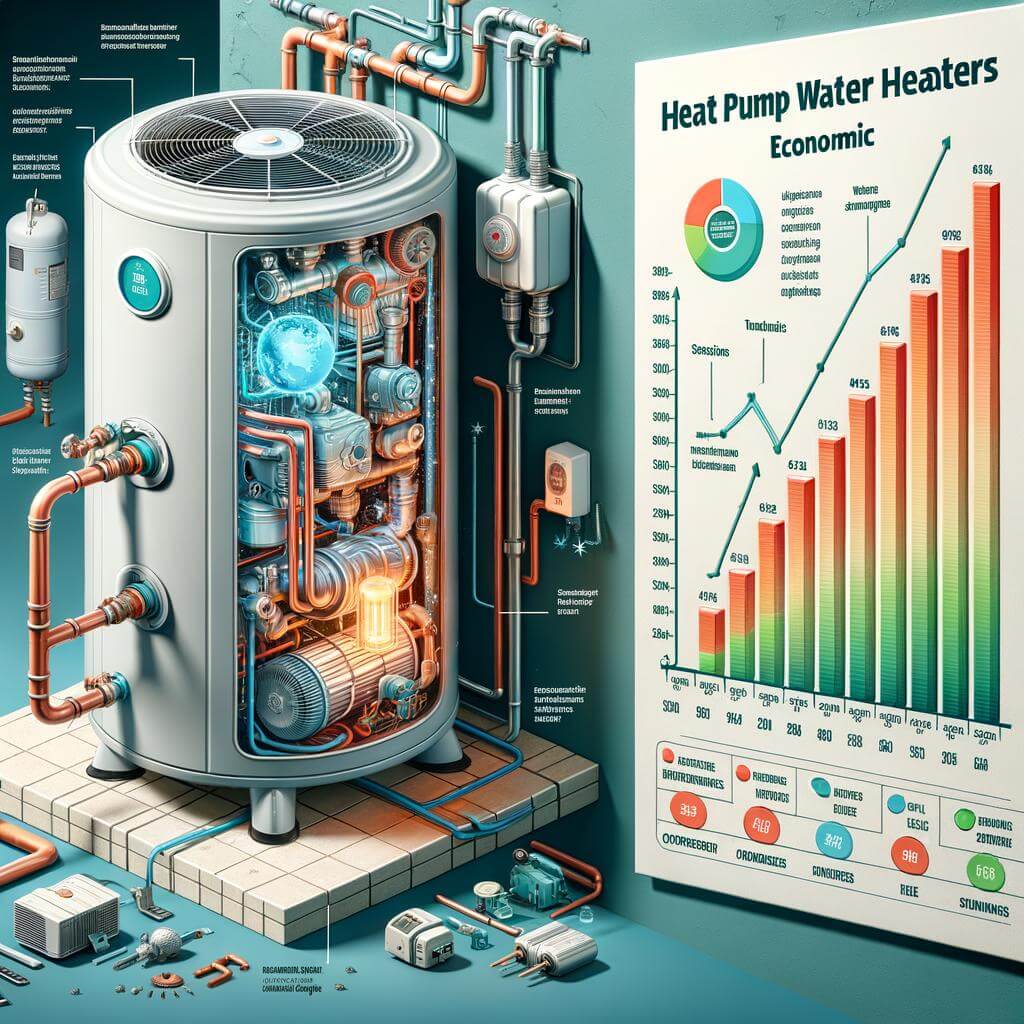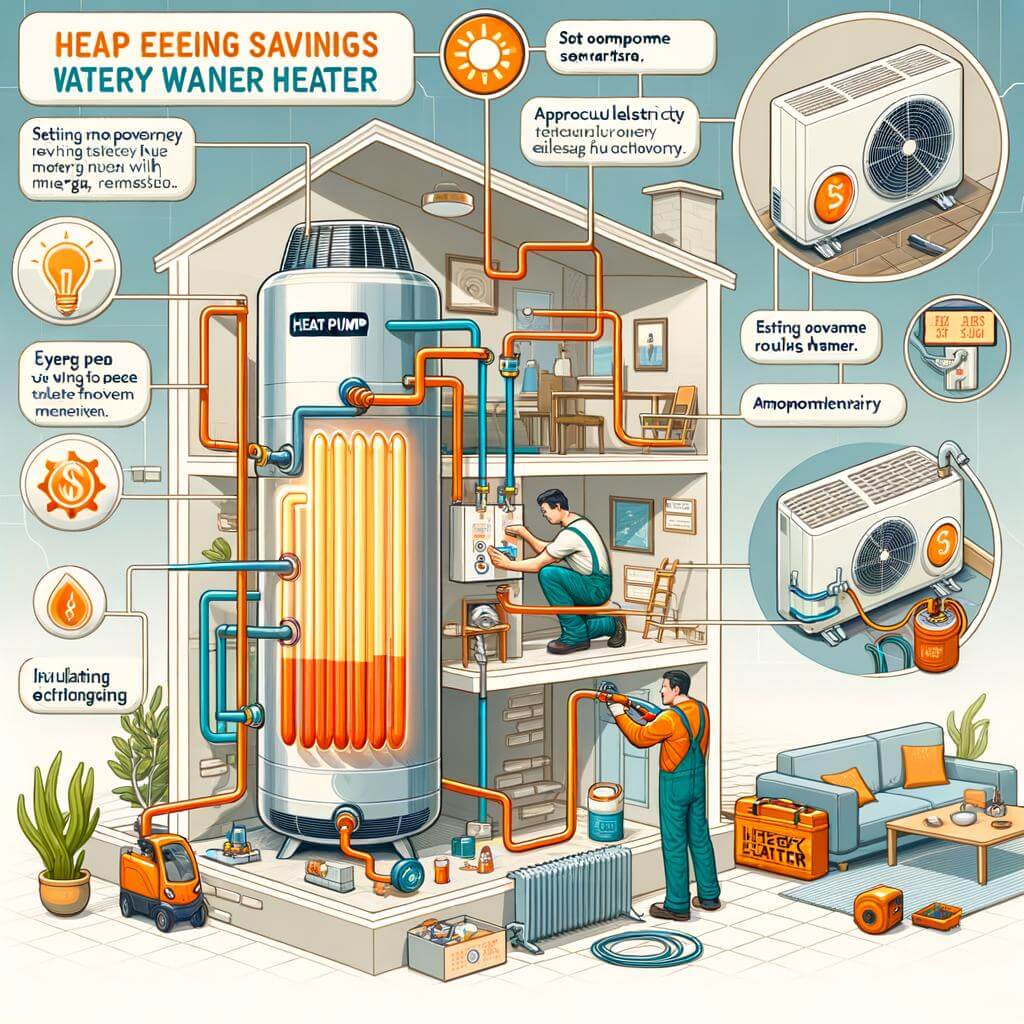Are you looking to save on your energy bills while reducing your environmental footprint? Our latest post, “Economic Savings with Heat Pump Water Heaters: A CA Plumber’s Analysis”, may offer just the solution you need. This factual and educational analysis from a trusted California Plumber’s perspective provides an in-depth look into the economic benefits of heat pump water heaters. It goes into detail on how these modern devices can help households and businesses save substantially on their energy expenses. With an easy-to-understand style, expert opinion, and helpful insights, this post can guide you towards a smarter, more sustainable way of heating water, and ultimately contribute to managing your finances more efficiently. So, let’s dive in to learn more about how switching to this innovative technology can benefit you.
Understanding the Basics of Heat Pump Water Heaters
For centuries, homeowners have turned to gas or electricity to power water heaters, a method which is neither economical nor entirely efficient. A more modern alternative gaining popularity due to its economy and efficiency is the Heat Pump Water Heater (HPWH). HPWHs move heat instead of creating it, that’s what makes them more efficient than traditional models. The process might sound complicated but it’s rather convenient and more importantly, it is extremely cost-effective.
- Heat pump water heaters use electricity to move heat from the air or ground to heat your water, essentially, they’re operating like a refrigerator but in reverse.
- The HPWH comprises of three main components: the heat pump which is responsible for heat transfer, water storage tank, and backup electric resistive elements which come into play when hot water demand exceeds the ability of the HPHP to produce it or when outdoor temperature is too low for heat transfer.
- HPWH save the average household approximately $300 every year on electric bills. In other words, they save $3,000 over a period of 10 years which is generally the lifespan of a water heater.
| Considerations | Heat Pump Water Heater | Traditional Eletric/Gas Heater |
| Efficiency | High | Medium |
| Installation Cost | High | Low |
| Operating Cost | Low | High |
| Life Span | 10-15 years | 12-13 years |
| Environmental Impact | Low | Medium to high |
The economic savings attributed to Heat Pump Water Heaters are substantial over the long run. Initially, the investment may seem high, but the continuous low operating cost and the longevity of the system compensates for the upfront cost. Furthermore, some electric companies and municipalities offer rebates to homeowners who install HPWHs, which can help offset the initial cost. In addition to monetary savings, you will be benefiting the environment by using a more sustainable heat source. Making the switch to a heat pump water heater is a decision that is both economically and environmentally sound.
Remember, every home is unique. The right solution depends on your specific needs, including the number of people in your home using hot water, your regional climate and your budget. I recommend consulting with a professional plumber to determine if a heat pump water heater is the best fit for you.
Economic Efficiency of Heat Pump Water Heaters
When it comes to choosing a water heater for your home, it’s imperative to consider both the short-term costs and long-term benefits. One of the most significant advantages of using heat pump water heaters is their economic efficiency. I’ve spent years installing and repairing water heaters throughout California, and the consistent feedback I receive from satisfied heat pump water heater owners is impressive.
From my professional experience, a heat pump water heater can save a household up to 60% in electrical costs every year compared to traditional electric water heaters. Let’s break it down using a simple comparison:
| Heat Pump Water Heater | Traditional Electric Water Heater |
|---|---|
| Consumes less energy | Uses more energy |
| Lower operating costs | Higher operating costs |
| Longer lifespan | Shorter lifespan |
Moreover, the savings don’t stop at reduced energy bills. Heat pump water heaters tend to have a longer lifespan than their traditional counterparts. An extended life expectancy means fewer replacements and saving even more money in the long run.
Finally, another financial advantage that might not be initially evident is the availability of utility rebates. In California, various utilities often offer attractive rebates for installing energy-efficient appliances, including heat pump water heaters. It’s always worth checking with your local utility company or the California Energy Commission if any promotional incentives can further offset the initial monetary investment.
So, while the upfront cost of heat pump water heaters may seem prohibitive, the long-term savings and benefits prove their worth for many homeowners.

Analyzing Savings: A Plumber’s Perspective
With an increasingly environmentally conscious society, understanding and implementing ways to save energy and money is a primary concern for homeowners and plumbers alike. One method of doing so is through the use of Heat Pump Water Heaters (HPWH); a product that has proven itself to be an eco-friendly and cost-effective solution for water-heating needs.
Heat Pump Water Heaters can extract heat from the environment and escalate it to a higher temperature for use. This process utilizes less electrical power compared to traditional water heaters that generate heat directly. However, the initial cost for an HPWH can be quite steep; but fear not – the real benefit comes from the potential long-term savings.
- Standard water heaters can amount to as much as 20% of home energy expenditures.
- HPWH, on the other hand, can be 2-3 times more energy efficient, significantly reducing your energy consumption.
| Expensive upfront cost | Potential Long-term savings |
|---|---|
| $800 – $1000 for a standard unit | $160 – $300 annual savings on electricity bills |
| $2600 – $3000 for an HPWH | Possible payback within 6 years |
Therefore, considering an HPWH as a part of your home’s plumbing system might be a financially savvy move. While the upfront costs are noticeable, the potential savings can offset those initial expenditures, making it an overall economically beneficial choice. However, it’s vital to make an informed choice - consider factors like the size of your household, local utility rates, available incentives, and personal comfort preferences. A qualified professional can provide valuable guidance in making the right choice that specifically suits your needs.

Factors to Consider when Switching to Heat Pump Water Heaters
The demand for Heat pump water heaters is escalating rapidly, offering more energy efficiency than conventional water heaters. Before making the shift, you should take into account a number of variables to ensure you make an informed decision. Efficiency and Cost of Operation are the prime factors to consider. Heat pump water heaters consume less energy, hence they can help to reduce your utility bill significantly. These systems use electricity to shift heat from one place to another instead of generating heat directly. However, the upfront installation cost may be higher than traditional models. Analyze the long-term savings against the initial cost to get a clear picture of potential savings.
| Factor | Description |
|---|---|
| Efficiency | Heat pump water heaters can be two to three times more energy efficient than conventional water heaters. |
| Cost of Operation | They use less energy, hence, lower utility bills. But, initial installation cost may be high. |
Before making a purchase, it is also essential to gauge the Availability of Installation Space and Climate Conditions in your area. Heat pump water heaters require a large space for installation and work optimally in warm climates. If the ambient temperature drops, the efficiency may decrease. Always check for warranties and ease of maintenance provided by the manufacturer.
| Factor | Description |
|---|---|
| Installation Space | Large space needed for installation. |
| Climate Conditions | Performs best in warm climates. |
| Warranty & Maintenance | Always check for warranties and ease of maintenance provided by the manufacturer. |
Bear these fundamental factors in mind to make the most out of your investment in an energy-efficient water heating system.
Strategies for Maximizing Energy Savings with Heat Pump Water Heaters
Many Californians are increasingly attracted to heat pump water heaters due to their potential for significant energy savings. However, to truly maximize these savings, it requires a combination of strategic placement, proper maintenance, and intelligent usage patterns. Let’s break this down into some tangible steps.
- Optimize placement: Heat pump water heaters work by transforming heat from one place to another, hence, placing it in a warmer area can enhance its efficiency. Furthermore, ensure that the space where it is installed is adequately ventilated.
- Regular maintenance: As with any mechanical system, routine maintenance is crucial. Cleaning the air filter and descaling the water tank helps to maintain the water heater’s efficiency.
- Smart scheduling: Synchronizing your heat pump water heater to coincide with your home’s peak energy usage times can help you reap maximum savings, as they have a recovery technology that works best during idle times.
Another effective strategy for maximizing your energy savings is investing in a model with an Energy Factor (EF) rating of more than 2.0. This figure signifies the energy efficiency of the heater, with a higher value indicating greater efficiency. Here’s a quick comparison of average yearly operating costs for heat pump water heaters with varying EF ratings:
| Energy Factor (EF) | Average Yearly Operating Cost ($) |
|---|---|
| 1.0 | 550 |
| 2.0 | 275 |
| 3.0 | 183.33 |
As you can see, a higher EF rating relates to lower operating costs, which translates into more energy savings. Heat pump water heaters are not only an environmentally wise choice but also an economic one when used efficiently.

Why California Residents Should Consider Heat Pump Water Heaters
Living in the Golden State comes with its fair share of prosperity and, unfortunately, energy costs. Enter Heat Pump Water Heaters (HPWHs). Utilizing ambient air to heat water, the HPWH could lower your energy expenditure by up to 60%. Your typical electric heater, by comparison, generates heat directly, leading to significant energy consumption. But, the HPWH moves heat, leading to more efficient usage.
The fact that HPWHs require less energy translates into significant cost savings for homeowners. In California, where electricity costs are among the nation’s highest, the potential savings from using a HPWH can be even more significant. To break it down, we’ve compiled a comparison table with the costs associated with standard electric water heaters and HPWHs.
| Type of Heater | Energy Consumption | Annual Energy Cost |
|---|---|---|
| Standard Electric Water Heater | High | $600 |
| HPWH | Low | $240 |
In addition to the obvious cost-saving benefit, installing a HPWH in your California home can also make you eligible for energy-saver rebates and potential tax credits. These incentives, combined with your long-term energy costs savings, make HPWHs an excellent choice for any budget-conscious homeowner.
In Conclusion
In conclusion, as detailed by our CA plumber’s analysis, the introduction and use of heat pump water heaters can play a significant role in economic savings. The benefits of these energy-efficient systems stretch much further than just your own utility bill. Reducing energy consumption is a shared responsibility and every small step plays a part in safeguarding our global environmental health. Embrace this modern, budget-friendly technology and help promote sustainability in our beautiful Golden State. Always remember, if you’re uncertain about any plumbing installations, it is always safest to seek the advice of a professional. Armed with all this knowledge, we hope you feel more empowered to make your home more economically and environmentally friendly. Remember, as the saying goes, a penny saved is a penny earned. Happy saving!




